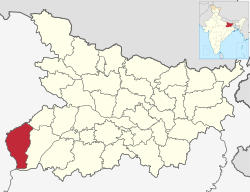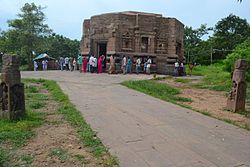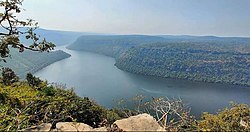Kaimur district | |
|---|---|
 Location of Kaimur district in Bihar | |
| Country | |
| State | |
| Administrative Division | Patna Division |
| Headquarters | Bhabua |
| Area | |
| • Total | 3,362 km2 (1,298 sq mi) |
| Population (2011) | |
| • Total | 1,626,384 |
| Time zone | UTC+5:30 (IST) |
| PIN | 8211xx (Kaimur)[1] |
| ISO 3166 code | IN-BR |
| Lok Sabha | Sasaram |
| Website | http://www.kaimur.bih.nic.in/ |
Kaimur district is one of the 38 districts of Bihar, India. The district headquarters are at Bhabua. Before 1991, it was part of Rohtas District. Till 1764 the region (Kaimur district) was a part of Ghazipur District and was a part of Kamsaar Raj and later it was a part of Chainpur Estate till 1837.
The district occupies an area of 3363 km2 and has a population of 1,626,384 (as of 2011[update]) with the rank of 307th in the country. The district has a Literacy rate of 69.34% (392nd in the country). Kaimur district is a part of Patna division. It is the Western-southern district of Bihar, Western-southern point of Bihar called Chand is situated on the Bhabua–Chandauli road. The district has 18 colleges, 58 high schools, 146 middle schools, and 763 primary schools. The district has a total of 1699 villages. The district also has 120 post offices and 151 panchayat, and is well connected with NH-2(Grand trunk road). Which is accomplished by Bhabhua Road (BBU) railway station it is the main route which connects Sealdah to Mumbai via Gaya junction.
The most spoken languages are Hindi and Bhojpuri. Due to its close proximity to eastern Uttar Pradesh, people here have Purvanchali tinge in their language.

